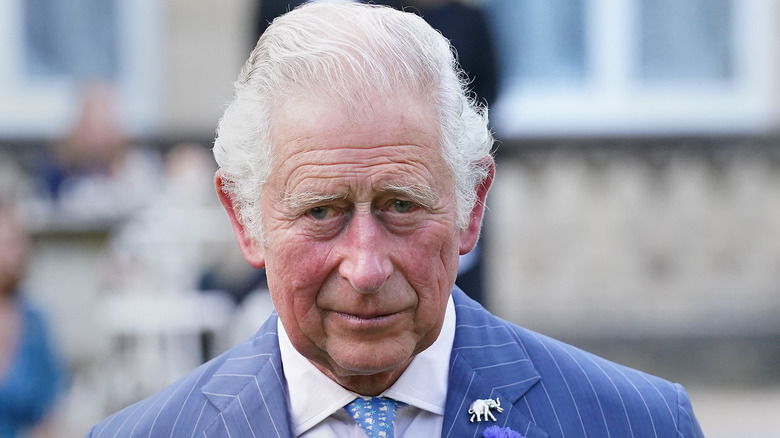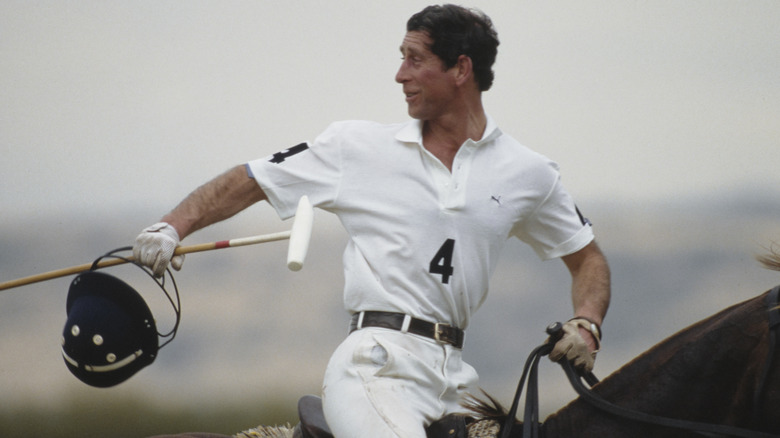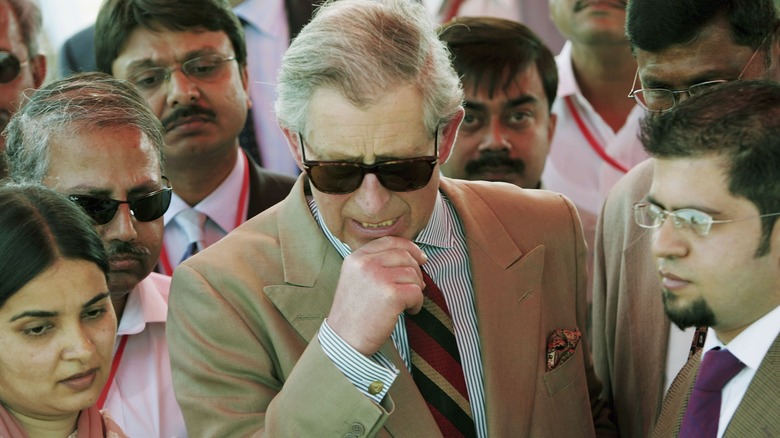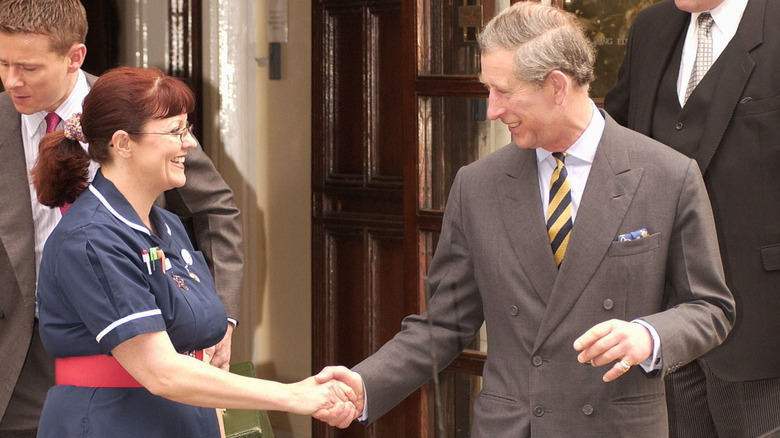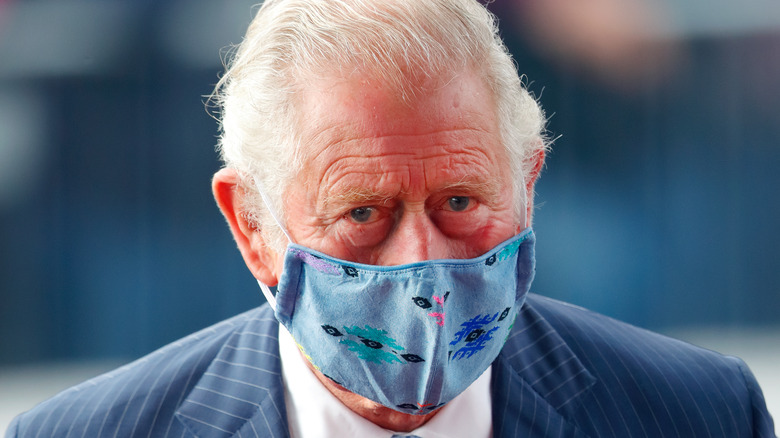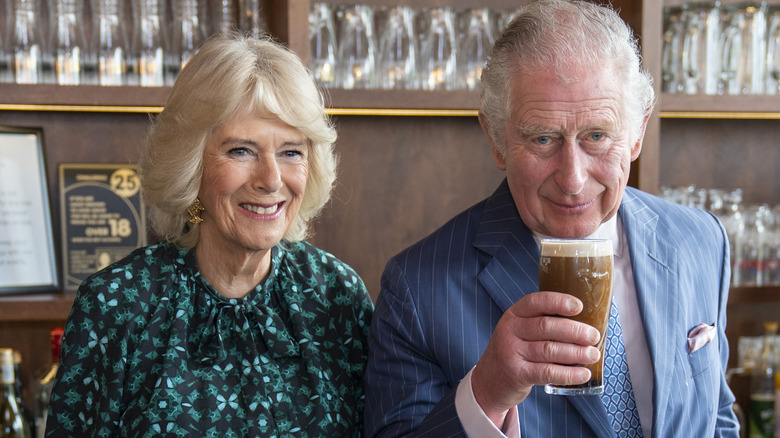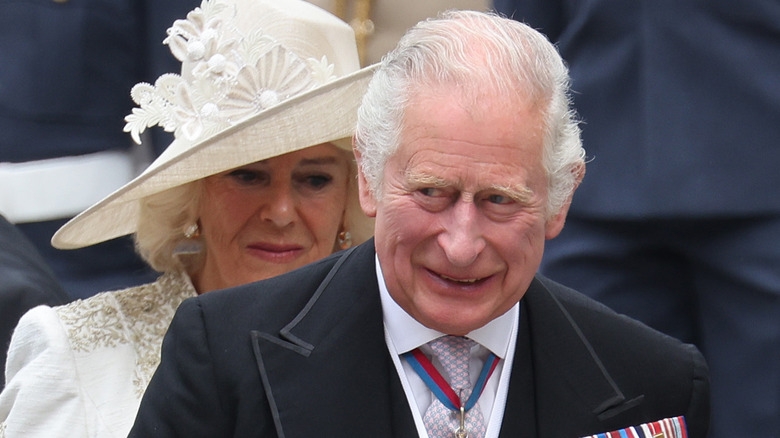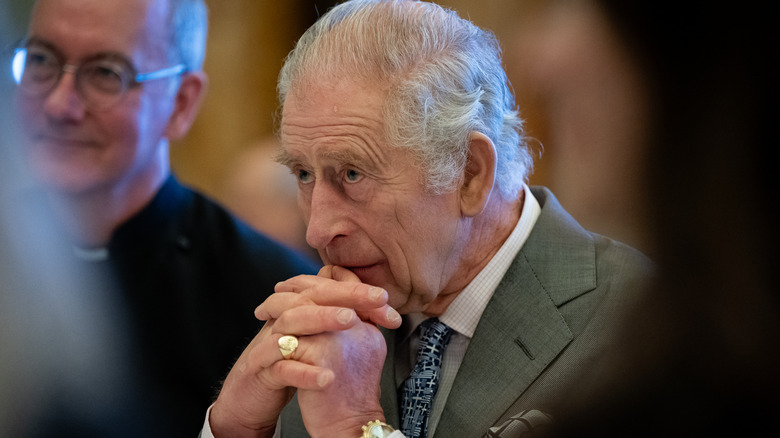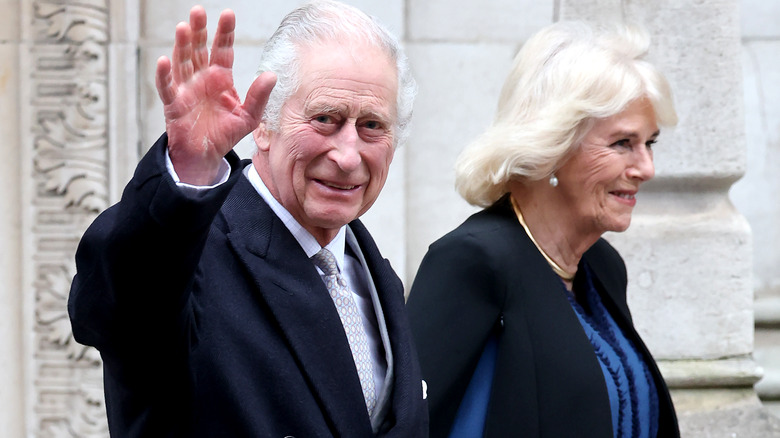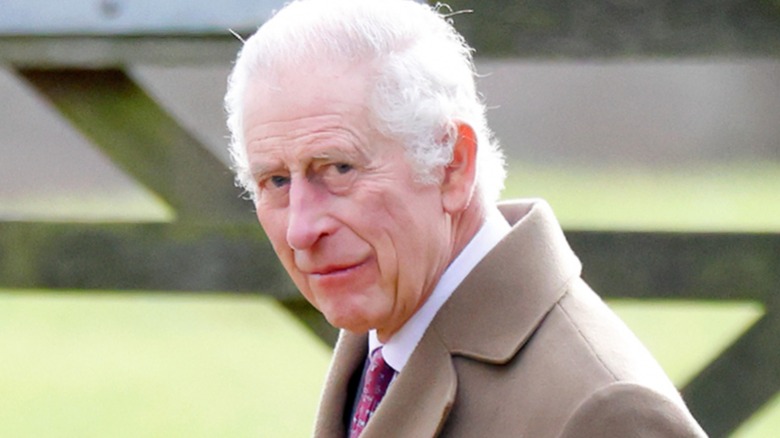Inside King Charles III's Health Issues
King Charles III is the oldest monarch ever to ascend the British throne. While this is an impressive feat, his age also raises questions from the public. It's no secret that ailments tend to plague us mere mortals as we get older, and King Charles, for all his blue blood, is not immune to aging. Both his parents lived long and mostly healthy lives, so one can assume that, if Charles inherited their good genes, he'd be monarch for quite a while.
The king is passionate about living healthy and sustainably — if his book "Harmony: A New Way of Looking at Our World" is any indication. Charles discusses climate change, sustainability, and the key to living a healthy life in its pages. With that said, we likely won't even be aware when Charles experiences serious health issues, because Buckingham Palace is a master at covering up royal ailments. Take Prince Philip, for example — the public was assured that he was doing well and "in good spirits" when he was hospitalized less than two months before his death. News about Prince William contracting COVID-19 only became public news several months after the fact. And then, of course, there was Queen Elizabeth II, whose health issues were downplayed almost right up to her death, dubbed as "episodic mobility issues." So, is King Charles as healthy as he looks? Let's investigate.
King Charles III has sustained several equestrian injuries
King Charles III has had many polo-playing accidents. In 1990, he fractured his right arm in two places after he found himself on the wrong end of a horse's hooves. Fast-forward to 1993, the then-Prince of Wales found himself dealing with severe back pain after going too hard during a game, which caused an old back injury to flare up. Then in 1998, Charles went fox hunting and fell, resulting in a broken rib. The year 2001 saw him hunting again, and this time an unplanned collision resulted in a shoulder injury. The fall that was perhaps the most dangerous of them all was in 2001 during a polo match with his two sons, Prince Harry and Prince William.
Speaking to NBC, Charles recalled the fall, saying that it knocked him unconscious. "The pony came down sideways and I must have landed absolutely smack on my head," he said. "[Harry] told me later that he thought, when I was lying on the ground, that I was — he said 'papa's just snoring,' and there I was busily swallowing my tongue and quietly dying," Charles said. He may or may not have been joking about that last part.
In his memoir "Spare," Prince Harry mentions in passing that Charles regularly practices headstands to counter the pain in his neck and back because of his old polo injuries.
King Charles III had to cancel past engagements due to severe back pain
Nobody would blink an eye if King Charles III started complaining about back pain today since the monarch is well into his 70s. But he dealt with severe back pain when he was still a spring chicken, so to speak. In 1991, then-Prince Charles had to forego several of his royal engagements because of debilitating back pain, which his doctor later said was because of a degenerative disk.
"He must rest," Charles' physician, Dr. John Webb, told The New York Times. "If he ignores it, he may need surgery." Dr. Webb also said that Charles had been dealing with the pain for five weeks at that point. Before his doctor spoke to the media, Charles announced that he'd played his last polo match for a while because it was aggravating his back pain.
In 2021, Charles admitted to the royal household's poet, Simon Armitage, that his back is "not so good" (via Express). When discussing his passion for gardening and how his back pain impacts his ability to plant trees, the king said, "I spend my life trying to do it on my knees ... but digging on your knees is an interesting business."
King Charles III needed to have a hernia repaired
In 2003, King Charles III was hospitalized to undergo surgery to repair a hernia. He got the hernia when he overexerted himself planting hedges. BBC News was quick to report on the then-Prince of Wales' hospitalization and the procedure he was undergoing. Again, Buckingham Palace assured the public that Charles was more than fine. Charles went out of his way to reassure royal watchers and the press that the surgery was not serious.
According to the Cleveland Clinic, hernias are pretty common and typically occur when weak areas in the stomach or groin give way and allow organs to bulge through the opening. Most hernias don't require immediate medical attention unless they are causing an obstruction or cutting off blood supply to organs or tissue. Most hernias need to be surgically repaired at some point. This was the case for Charles. Hernia repair surgery is usually simple and is considered a minor procedure. So when Charles was leaving the hospital post-op, he was basically back to his old self, greeting royal fans and reporters gathered outside, and even cracking jokes. "Hernia today, gone tomorrow," he quipped as he waved to those gathered outside King Edward VII hospital.
Even though the procedure was a minor one, Charles still took a week off to rest and recover. The palace called the surgery "a fairly routine operation," saying that Charles was "very cheerful as he left the hospital."
King Charles III needed to have a benign growth removed
In 2008, King Charles III developed a small growth on his face, which he had removed. When you do some digging on royal health issues, you'll find a predisposition for non-cancerous facial growths. Prince Philip had a benign growth surgically removed from his nose in 1996.
The American Cancer Society notes that, sometimes, benign growths or tumors are hereditary and often occur because of what is known as "family cancer syndrome," meaning that certain cancers run in a family, with the growths being an indication that the cancer might be present in an individual. Even if benign growths or tumors are not an indication of family cancer syndrome, they have the potential to become malignant if left untreated, according to a 2020 study published in JAMA Oncology. This is why they're usually removed.
The procedure King Charles underwent to remove the non-cancerous growth from his face was very minor, so much so, that he left the hospital and went straight to a royal engagement at his Highgrove house afterward. The bandage covering the surgical site on the king's nose was the only evidence that he'd had a procedure. He'd soon go on to happily plant trees during a ceremony, looking fit as a fiddle.
In 2020, King Charles III contracted COVID-19
After the COVID-19 pandemic hit in 2020, it was only a matter of time before we normal folks started hearing about our favorite celebrities contracting the virus — and the royal family was no exception.
News that King Charles III contracted the virus spread like wildfire in March 2020. At the time, the then-Prince of Wales was one of the 400,000-plus people who had already gotten sick with the virus after the pandemic broke out. As we all know, these numbers rapidly multiplied. Buckingham Palace once again assured the public that all was well and that there was no need to be distressed. "The Prince of Wales has tested positive for Coronavirus. He has been displaying mild symptoms but otherwise remains in good health and has been working from home throughout the last few days as usual," a press statement released by Clarence House read (via Today).
Charles was believed to have possibly contracted the virus from Prince Albert of Monaco. Albert and Charles mingled while attending the Water and Climate Aid Summit in London, and the Prince of Monaco was diagnosed with COVID mere days after the event. Charles was overwhelmed with well-wishes from royal fans after news of his diagnosis broke and took to his official X (formerly Twitter) page to thank the public for their messages. The King's Clarence House account posted a smiling image of him with the caption, "He is enormously touched by your kind words."
King Charles III deals with an unknown condition that causes severe swelling of his hands
When you become the new monarch, you can expect the public to take a much greater interest in you. In the months leading up to King Charles III's coronation, royal watchers and the British press had an obsession with the future King's hands, which more often than not appeared to be painfully swollen.
Royal watchers first became intrigued by Charles' hands when he and Camilla, Queen Consort, attended a royal engagement in South London in 2021. During this visit, Charles was pulling a pint of beer, and the photographs showed off his swollen hands. Soon, "Charles' sausage fingers" dominated Google's most-searched terms in the U.K. This isn't a recent issue for the King, however. He's been dealing with it since at least 2012 when he jokingly referred to his swollen hands as "sausage fingers." Speaking to the Daily Mail, Chun Tang, M.D., said that the king's swollen hands could have various underlying causes. The condition is referred to as dactylitis and could indicate that someone has bacterial infections, arthritis, inflammation, or even tuberculosis. "Other possibilities include high salt levels, allergic reactions, medicinal side effects, injury, and autoimmune diseases," Tang explained.
Given Buckingham Palace's track record with being straightforward about royal ailments, we likely won't know the true cause of King Charles' swollen hands anytime soon.
King Charles III got sick with COVID-19 again in 2022
Almost two years after kicking COVID-19, King Charles III found himself behind the palace walls once again with the virus. It seemed that he was none too thrilled with the situation, with his wife, Camilla, Queen Consort, telling those present at a royal engagement that her husband was not exactly happy that he had to self-isolate and was finding it "a bit tiresome" (via The Guardian).
Charles' official X account broke the news of his second COVID-19 infection. "This morning The Prince of Wales has tested positive for COVID-19 and is now self-isolating," the post read. "HRH is deeply disappointed not to be able to attend today's events in Winchester and will look to reschedule his visit as soon as possible." The comments were, once again, filled with well-wishes from royal watchers. Some, however, criticized Charles for no longer wearing a mask during public engagements.
This time around, it wasn't clear where the king might have contracted the virus, but there were some concerns that he could have infected his mother, Queen Elizabeth II, since he had spent time with her shortly before his diagnosis. Buckingham Palace revealed that the queen's vaccinations were up-to-date and that she would be tested for the virus daily. Charles' vaccinations were presumably up-to-date, as well — in December 2021, he and Camilla were encouraging the public to get their booster shots after they made sure to get their own.
There are plans in place should King Charles III's health decline
When you're the monarch, certain protocols must be in place so things can continue as normally as possible should your health decline. As it turns out, the House of Lords has already begun working on a contingency plan should King Charles III fall so ill that he's unable to fulfill his duties as monarch.
The proper protocols are contained in what is known as the Regency Act. This act stipulates who is responsible for taking over the king's various duties when he is unfit to work. Usually, this responsibility falls to the person who is next in line to the throne — in this case, Prince William.
The Prince of Wales won't be the only one fit to step in, however — senior members of the royal family can do so as well, which, in a perfect world, would also include Prince Harry and Prince Andrew. But with Prince Harry no longer being an official member of the royal family and Andrew being sidelined because of sexual misconduct allegations, Princess Anne and Prince Edward are the most likely choices. For this to be official, however, the act has to be amended since it still stipulates that Prince Harry and Prince Andrew are Counsellors of State. With Harry in California and Andrew a disgraced royal, neither of them would likely be able to take over should something go very wrong.
King Charles III received treatment for an enlarged prostate in 2024
In January 2024, royal watchers were concerned when news broke that King Charles III was undergoing a procedure in hospital. For the most part, it isn't common for monarchs to let their health issues be known, but according to a palace insider who spoke to ABC News, Charles hoped that sharing his ailment would help raise awareness of the condition.
On January 17, the palace released a statement that said the ruler was scheduled for a procedure in the next week for an enlarged prostate. On January 29, the palace released another statement mentioning that Charles was discharged from the hospital and rescheduled upcoming engagements while he recovered, but that he was doing well. "His Majesty would like to thank the medical team and all those involved in supporting his hospital visit, and is grateful for all the kind messages he has received in recent days," wrote Buckingham Palace.
Longtime fans of Charles were undoubtedly elated to see the king back on his feet, smiling and waving as he left the hospital. While not ideal, Charles' prostate issues aren't unheard of for someone his age, with many men often finding themselves facing the same procedure.
The king was diagnosed with cancer in 2023
In January 2024, King Charles III underwent treatment for an enlarged prostate. Shortly thereafter, on February 5, 2024, Buckingham Palace announced that King Charles III had been diagnosed with cancer. "During The King's recent hospital procedure for benign prostate enlargement, a separate issue of concern was noted," the palace wrote in a statement. They announced that the king would postpone public duties until further notice, though he would continue to keep up with behind-the-scenes duties and paperwork while undergoing treatment. "His Majesty has chosen to share his diagnosis to prevent speculation," the statement read.
The news sent shockwaves through the royal family and fans. People reported that the king had personally broken the news to his sons, Prince William and Prince Harry. In addition, they noted that Prince Harry — infamously estranged from his family — planned to travel to the United Kingdom in order to be by his father's side. According to Buckingham Palace, the king had already begun treatment by the time the news was announced. "He remains wholly positive about his treatment and looks forward to returning to full public duty as soon as possible," the palace wrote.
After the news broke, well-wishes poured in for King Charles from around the world. "God Save the King" trended on X, formerly Twitter, and Prime Minister Rishi Sunak shared a positive message as well. "I have no doubt he'll be back to full strength in no time," Sunak tweeted.

